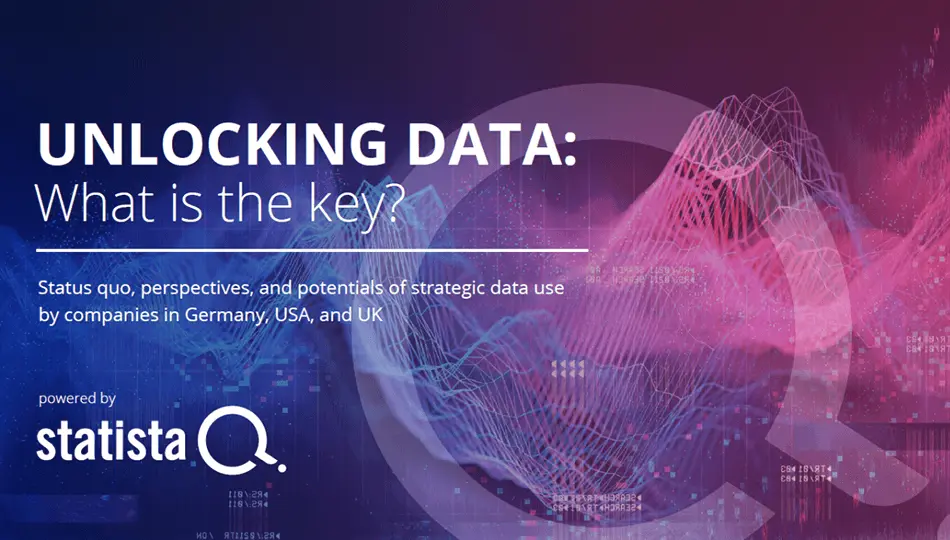Unlocking Data: What is the Key? – Results of a large-scale survey on strategic data use by companies in Germany, USA, and UK
In an increasingly data-driven world, data-based decision-making secures competitive advantage and corporate success. Establishing data strategies, however, is challenging. Companies not only need to collect data but also manage, analyze, and transform it to valuable insights and data-driven actions.
Based on a survey of 1,200 executives, experts from Statista Q described status quo, perspectives, and potentials of corporate data use. Why is data a No. 1 resource, what are the biggest challenges for usage, and which aspects are crucial to implement value-adding strategies and data-driven business models? The most relevant results are presented below.
Data makes the difference
Data is essential—and companies know this: 70 percent of executives consider themselves to be part of a company with high data relevance. 65 percent expect data to become even more relevant within three years.
Comparing industries, data is particularly relevant for mobility, consulting, telecommunications and IT, and finances. Mobility-as-a-service-providers, for example, use data structures, data streams, and interfaces to bundle access to mobility services in one single platform. The technical integration of data is the core of their future-shaping business model.
Data shapes decisions
Mobility-as-a-service-providers use data for external value creation. In most companies, however, data primarily supports internal value creation. Success doesn’t come from data alone, but from data-driven decisions.
In Germany, around 60 percent of executives often make their decisions after evaluating data, while 30 percent exclusively or almost exclusively decide on their data basis. In the US, the latter is even more widespread: Almost 40 percent of US executives decide (almost) exclusively data based.
“As a globally operating company, it is important to understand our customers‘ value chains. Only with in-depth customer-centric data we can obtain market information for all parts of the entire value chain. Statista Q has provided us with information from over 400 sources and analyzed the potential and complexity of value chains for 16 selected market segments.”
Rikke Hendrich Nielsen Vertical Customer Insights Manager at Mærsk
Data is valuable
Well-founded data strategies promise cost reduction and sales growth: The majority of companies expect that a more effective use of data will result in 10 to 40 percent lower costs and 10 to 50 percent more sales. Those who are already on the road to fully utilize their data’s potential expect even higher benefits. The most mentioned hurdles, however, are a lack of time, personnel resources, and know-how. It is possible to set up a data-driven business model with just a few data-savvy employees—but in the long term, data literacy will be a key competence for everyone. So far, less than 30 percent of executives rate their employees’ data literacy as “very good” and only a quarter of the companies already use complex methods such as self-learning algorithms or internally conducted market research.
“In our understanding, data literacy is the ability to collect, understand, and analyze numerous and complex data points. Statista Q has used their expertise to create economic impact studies for our global live events.”
Philip Marz Head of Regional Marketing for Pokémon Go (EMEA) at Niantic
Outsourcing is attractive
External data service providers can cover what can’t be covered internally due to a lack of time, personnel, know-how, or else: Almost 30 percent of companies frequently outsource data-related processes, and nearly 50 percent have done so occasionally. Moreover, around 70 percent of executives say they would like to rely on external expertise more often. 60 percents assume their data-related expenditures to (strongly) increase within the next few years.
Unlocking data—the keys to success
The above-mentioned results show: Companies have recognized the relevance of data and are well on the way to value-adding data usage. Challenges are natural companions of transformation—three aspects are leading approaches to overcome them:
- Organizations must identify and focus on the most relevant data and data sources. Ideally, data collection and research are followed by data preparation, data management, and quality assurance.
- Internal competence should be developed across all business areas. In an increasingly data-driven world, companies must proactively involve their entire workforce in data usage.
- However, companies do not need to walk alone the path to use data successfully. External data service providers are strong partners who complement limited internal capacities in terms of time, personnel resources, and know-how.
Methodology:
Results are based on an online survey conducted by Statista Q in August and September 2022 among samples of each 400 executives from companies in the US, Germany, and the UK, covering different industries and business areas.
Download the full whitepaper for free at Statista Q.










 by
by 

